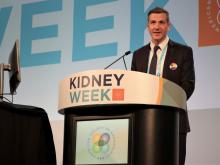ORLANDO – Automated alerts sent to clinicians via patients’ electronic health records identified patients with diagnosable acute kidney injury (AKI) who were taking one or more medications that could potentially further worsen their renal function. This led to a significant increase in discontinuations of the problematic drugs and better clinical outcomes in a subgroup of patients in a new multicenter, randomized study with more than 5,000 participants.
“Automated alerts for AKI can increase the rate of cessation of potentially nephrotoxic medications without endangering patients,” said F. Perry Wilson, MD, at Kidney Week 2022, organized by the American Society of Nephrology.
In addition, the study provides “limited evidence that these alerts change clinical practice,” said Dr. Wilson, a nephrologist and director of the clinical and translational research accelerator at Yale School of Medicine in New Haven, Conn.
“It was encouraging to get providers to change their behavior” by quickly stopping treatment with potentially nephrotoxic medications in patients with incident AKI. But the results also confirmed that “patient decision-support systems tend to not be panaceas,” Dr. Wilson explained in an interview. Instead, “they tend to marginally improve” patients’ clinical status.
“Our hope is that widespread use may make some difference on a population scale, but rarely are these game changers,” he admitted.
“This was a very nice study showing how we can leverage the EHR to look not only at drugs but also contrast agents to direct educational efforts aimed at clinicians about when to discontinue” these treatments, commented Karen A. Griffin, MD, who was not involved with the study.
A danger for alert fatigue
But the results also showed that more research is needed to better refine this approach, added Dr. Griffin, a professor at Loyola University Chicago, Maywood, Ill., and chief of the renal section at the Edward Hines Jr. VA Medical Center in Hines, Ill. And she expressed caution about expanding the alerts that clinicians receive “because of the potential for alert fatigue.”
Dr. Wilson also acknowledged the danger for alert fatigue. “We’re doing these studies to try to reduce the number of alerts,” he said. “Most clinicians say that if we could show an alert improves patient outcomes, they would embrace it.”
Dr. Wilson and associates designed their current study to evaluate an enhanced type of alert that not only warned clinicians that a patient had developed AKI but also gave them an option to potentially intervene by stopping treatment with a medication that could possibly exacerbate worsening renal function. This enhancement followed their experience in a 2021 study that tested a purely informational alert that gave physicians no guidance about what actions to take to more quickly resolve the AKI.
These findings plus results from other studies suggested that “purely informational alerts may not be enough. They need to be linked” to suggested changes in patient management, Dr. Wilson explained.


